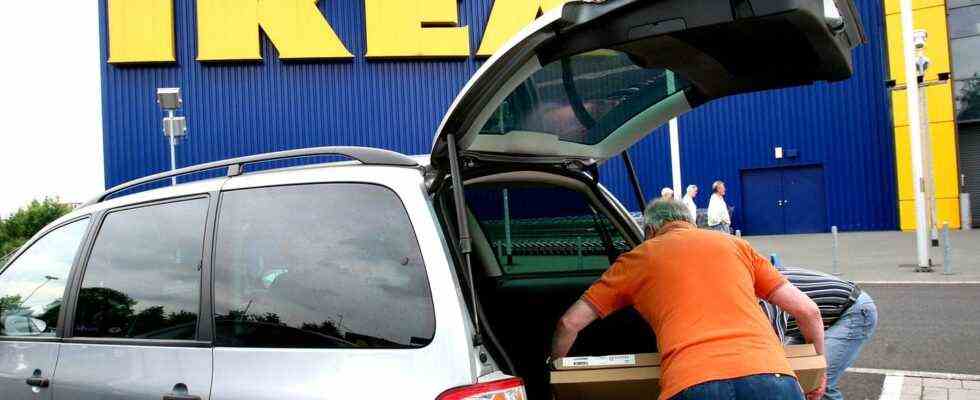Building Ikea’s furniture is a horror for many customers. It’s practical that the Swedish group has its own furniture assembly service. But the criticism is massive.
Ikea is one of them Germany’s most popular furniture retailer. In this country, the Swedish group makes more than five billion euros in sales with inexpensive furniture – which, however, still has to be assembled by the customer. That may still work for simple shelves. But a complex cupboard can hardly be created for the technically inexperienced. Task Rabbit is just for these cases.
A customer from Marbach am Neckar also wanted to use this service. She ordered the assembly service directly from the Ikea branch, she reports to the “SWR“. The order will be carried out by the partner company Task Rabbit, they let them know. Since they bagged the order directly through Ikea, the customer doesn’t have a bad feeling. A big mistake, as will be shown.
The partner company Task Rabbit is a wholly-owned subsidiary of Ikea. The group has outsourced all assembly orders there and is also advertising them on the Internet. “We know that it is not always easy to assemble furniture yourself. […] Task Rabbit gives you simple, affordable ways to have your IKEA products assembled at home, “it says.
The prices are based on the amount of work. A loft bed costs 91 euros, a simple wardrobe 50 euros. A two-meter wardrobe including sliding doors costs 200 euros.
Task Rabbit under fire
In practice, it went like this for the customer: Your order was pushed to the so-called taskers a week in advance. There, the non-employed taskers can report back freely. For the customer, that seemed serious until then. “Two taskers should report to take care of the installation here on site,” said the customer. “To me it sounded the whole time that certified, skilled craftsmen come to us.”
A “professional service” from people who “do this regularly” and “earn their living with it” – with this assumption, the customer had completed the order.
After three or four days a “Tasker” answered. However, the customer found that strange, because the man only answered under his first name, and there was no phone number for further questions. And the man wanted to know if he would have to bring his own tools for the job.
That sounded not very trustworthy. The second tasker, which is needed for the construction, did not answer at all until the evening before the construction day. So the customer wanted to contact Task Rabbit. But there was nothing to be done over the phone, and the chat function didn’t work either. No Tasker came on the day of construction. The customer stayed seated on her Ikea furniture boxes.
The frustrated customer is not an isolated case, including that star reported a customer of her negative experiences. With her, the service was canceled at very short notice, without an alternative date. The order was worth several hundred euros. The company tried to persuade the customer to make another attempt, then sent two or three emails. Then the customer service department probably ticked it off – again an order that was not carried out, another lost customer.
A look on the net confirms the experience: There was also trouble with other customers. Almost ten percent of the ratings on the “Trustpilot” rating platform are “unsatisfactory”, meaning they received the worst rating. One customer writes: “The craftsman came without tools and caused various damage. The processing of the damage repair takes months and is just annoying. Dubious company with bad and unqualified employees.”
A look at the 80 percent rate in the top ratings is suspicious: Taskers themselves praise their service or a customer writes that you can tell that the Tasker has eight years of Task Rabbit experience. The fact that the company hasn’t been around that long doesn’t seem to bother. And: The many good reviews do not come from Germany. If you only compare the reviews written in German, it becomes clear that there are significantly more negative than positive reviews. The 80 percent satisfaction does not seem to have been achieved, at least in Germany. Almost one of the complaints at Trustpilot shows that customers are mostly annoyed about appointments canceled at short notice, sloppily built furniture and the resulting additional costs that the customers are left to sit on alone.
Taskers are not checked
The craftsmen are said to have been tested. If you want to find out more about Tasker on the Ikea homepage, can read there: “You can choose a qualified Tasker verified by TaskRabbit”. So is the staff checked? The “SWR” does the test. A technically clumsy reporter registers with Task Rabbit with a made up résumé. Your qualifications are not checked, but you can take orders from customers and get started.
When asked how this can happen, the company replied: “When you register on the platform, Taskers must confirm that they only offer and perform services for which they have the necessary knowledge and skills. Taskers and customers have the opportunity to discuss the scope of the work before booking and to clarify whether the tasker has the experience and skills required by the customer. “
Suddenly it no longer sounds as if Task Rabbit or even Ikea itself is checking the qualifications of the Tasker. The customer bears the risk that the tasker breaks something or is not sufficiently qualified at all.
Platform business as a problem
The problem: Task Rabbit is more of a marketplace or platform business, i.e. an online broker of orders that itself does not offer any liability or guarantee. Julia Gerhardt from the Rhineland-Palatinate consumer center knows that too. The companies would stay out of the drafting of contracts, but customers would not be able to see that clearly. The contract comes about with the Tasker, of whom one only knows the first name. The customer does not know whether it is insured against damage it causes.
In fact, this is a big problem, as the negative reviews on the Internet show: If damage occurs, customers are usually left with it. Because Task Rabbit also refuses to accept any liability in the terms and conditions. It says that Task Rabbit merely connects customers and contractors with one another. Specifically, it says in the terms and conditions: “The company is not responsible for the performance or communication of users, nor does it control the quality, timing, legality, failure to perform or any other aspect of the tasks, taskers or customers, nor does it check the integrity, accountability or competence , Qualification or any act or omission […]. The company does not warrant or make any representations for the suitability, reliability, adherence to schedules or accuracy of the tasks ordered by users identified via the TaskRabbit platform or for the services provided by such users […]. “
The expert criticizes “misleading”
Friedemann Kainer, expert for German and European business and labor law and Professor at the University of Mannheim, criticizes this procedure on two points: Firstly, Ikea guarantees on the company’s website that the assembly will take place. And on the other hand, there is a promise of satisfaction from Task Rabbit, said Kainer. “That is then put into perspective for five pages so that basically nothing remains of the promise of satisfaction,” says expert Kainer. “That is misleading. That is why it is impermissible under terms and conditions and also a violation of competition law.” The “SWR” confronts Task Rabbit with the assessment of the law professor. And get no answer. And Ikea? The company points out that the contract was made directly between Tasker and the customer. If there is a complaint, “he / she should contact Task Rabbit directly via the relevant contact options.
All this is of little use to the customer, she is dissatisfied that Ikea has not explained to her “that they are day laborers or people who like to assemble furniture in their free time”. In the meantime she has had the closet built by another company.
Here you can view the “SWR” report in the media library.
Also read:
Why Ikea is only slowly conquering German city centers
Ikea in the City – why the furniture company is changing its strategy for branches
Cordless drills from the discounter: Why Lidl relies on craft products
With this strategy, H&M wants to fight its way out of the crisis



